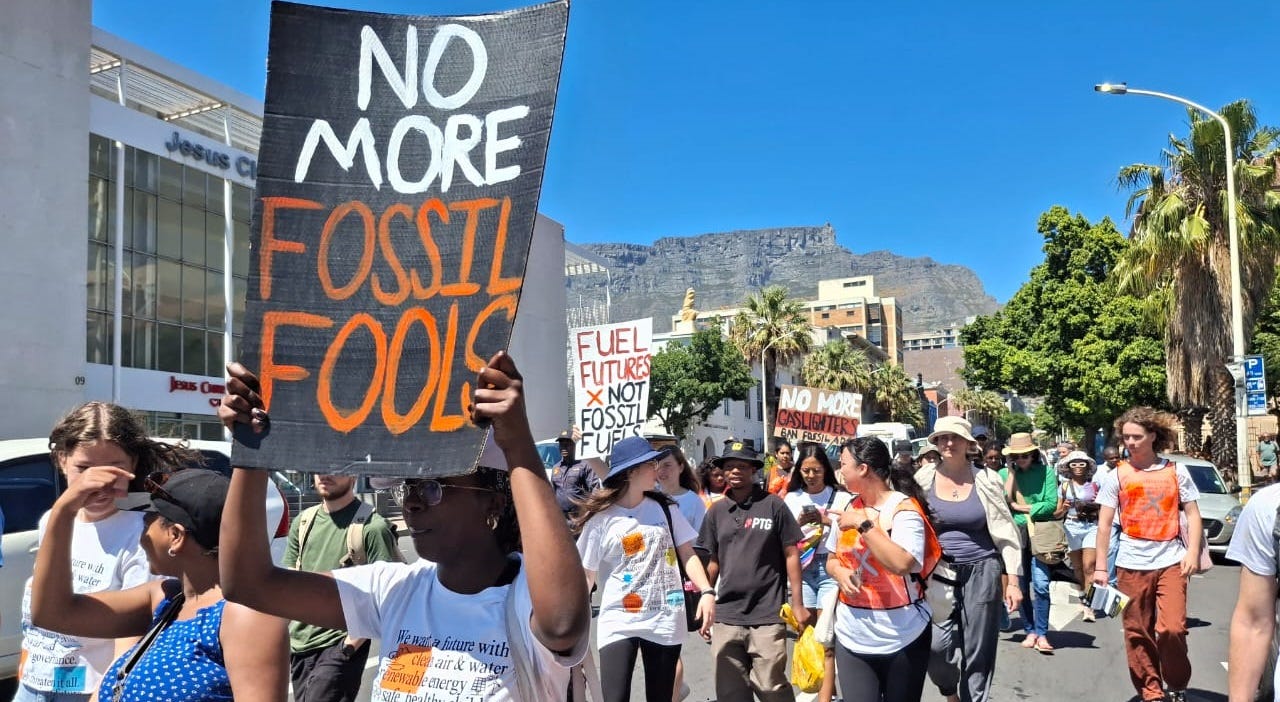'The Arch would have given his rousing support to your walk'
Our first Investment Justice Walk to key landmarks in Cape Town highlighted the role divestment played in ending slavery and apartheid, and how it could yet help slow climate breakdown.
Our Investment Justice Walk on Friday 15 November would have had “the rousing support” of Archbishop Desmond Tutu were he still alive, said Janet Jobson, CEO of the Desmond and Leah Tutu Legacy Foundation, speaking outside the District Six Museum during our walk on Friday 15 November.
The walk began at St. George’s Cathedral and visited Cape Town landmarks that, together, tell the story of how finance has been used to start and end major epochs, including slavery and apartheid; how it is being used to exacerbate climate breakdown, and how, with divestment, this could be turned around.
Now, more than ever, we must shift hearts and minds
“Archbishop Desmond Tutu felt that sanctions, divestment and boycotts were a really powerful tool to shift not just physical investments but the consciousness of the world,” said Jobson. “What we saw during the anti-apartheid struggle is that the people of the world came together under a single directive, to divest from South Africa.
“And now it’s time we do that for fossil fuels. It’s time we take every step that we can, on climate change.”
This is particularly pertinent as we see a new government coming into place in the US, which is “likely to completely scupper the climate change agenda.
“Now more than ever we have to rely on shifting the hearts and minds of corporates, of people and of civil society movements. We have to take back the power, to shift these dynamic for the future of humanity itself.”
The walk went to the Slave Lodge, Parliament, the District Six Museum, the Civic Centre and the entrance to the V&A Waterfront – which had revoked its permission for us to enter further due to “pressure” from “stakeholders”. We had planned to discuss the heavy fossil fuel investments of Allan Gray and Ninety One asset managers while visiting their offices at the Waterfront but neither asset manager was willing to welcome us (though both have indicated they are open to other meetings).
First divestment movement targeted slavery
Speaking outside our first stop, the Slave Lodge, Fossil Free South Africa director David Le Page noted that one of the first divestment movements in history was started in opposition to the slave trade.
In April 1688, four Dutch members of "The Society of Friends," as the Quakers were then known, sent a short petition “against the traffick of men-body” to their international meeting in Germantown, which ducked the petition. However, in 1758 the Quakers prohibited their members from buying or selling slaves, and in 1776, Quakers who still owned slaves were expelled from the society.
Slavery continued under the British, and while external slavery ended in 1808, South African slaves were not all emancipated until 1840.
Reparations of at least £3 billion in present-day terms have been paid to compensate slave owners, and the UK only finished paying off this debt in 2015. However, it continues to oppose reparations for the enslaved themselves, some of whom are paying taxes that help recompense their ancestors’ “owners”: UK Prime Minister Keir Starmer has said he would rather not “spend a lot of time on the past”.
Parliament’s pension fund
We then walked to parliament, noting that at same the time, South African government representatives were negotiating at COP29, the annual international climate negotiations, in Azerbaijan.
David observed that the Paris Agreement on climate change − the world’s best hope at averting catastrophic consequences − is “effectively dead”, as countries and companies are nowhere near on track to meet its emissions reduction targets. Rather than warming of under 1.5C by 2100, the world is on track to hit 2.2 or 3.4C this century.
“The Paris Agreement produced a framework for Net Zero, which allows countries and companies to make commitments for the far-off date of 2050 while continuing business as usual, under the guise of at some point finding a way to capture emissions. It’s an increasingly hollow construct.”
For more detail on how the Net Zero framework is a failure, please see this recent article from The Conversation and Daily Maverick.
Also speaking outside parliament, #InvestFossilFree campaigner Steph Cookson noted that even at current levels of warming, major disasters are taking place in Africa.
These include the drought in the Horn of Africa, made 100 times more likely by climate change, and the floods in the Libyan city of Derna in September last year which killed between 10 and 20,000 people, and which were made 50 times more likely by climate change.
Members of parliament have their own pension fund, called the Political Office Bearers’ Pension Fund. We were curious ahead of this march to know what ethical strategy that fund has (if any), and sent questions to its representatives a few weeks beforehand about what investments it might (or might not) have in fossil fuels and offshore armaments.
They promised to give us a note summarising that information but told us on the morning of the walk that they had the date for approving the note wrong, and their committee hadn’t concluded that it could release the information. We await news and will let you know when it arrives. We are most interested to discover whether SA parliamentarians have investments that conflict with their constitutional and political duties. (In the brief video below, the police escort us through the busy streets of Cape Town.)
City of Cape Town’s commitment to divest
When we reached the Civic Centre, Alderman Siva Moodley representing the City, read out the City’s address in a very genial manner, noting that both FFSA and C40 Cities had petitioned the City of Cape Town to divest from fossil fuel companies in 2017, following which the City had made that commitment.
He outlined the City’s many other climate-friendly policies, and has since forwarded us the text of his talk (available on request), listing all of these. It was disturbing, though, to hear that the City does not monitor compliance with its investment policies. Questioners also challenged the logic of the City rolling out the red carpet to companies like Amazon that miss their climate targets and exploit their workforce.
Predicting sea level rise in Cape Town
When will the sea level rise in Cape Town and by how much, we asked Dr Marieke Norton, of the African Climate and Development Initiative at UCT, who very kindly addressed us at the Waterfront.
“We know that sea level rise is going to happen; we’re not uncertain about that. The uncertainty is the rate at which it will happen,” she said. “No models are perfect but they are all useful, so we’re learning and teaching the models as we go.
“The predicted sea level rise in Cape Town is 2mm per year, which doesn’t sound like much but coupled with storm surges and weather on land... we are looking at several metres by 2050 in some areas and… between 2m and 5m by 2100.”
Coastal settlements are particularly vulnerable to climate breakdown as they experience both extreme weather events and rising sea levels, she observed.
Hard infrastructure such as canals and harbours could exacerbate impact of storm surges on other areas nearby. Woodbridge Island beach is one area where sea level rise is highly visible, “where we are losing metres of beach, which starts to affect private landowners… their property gets eroded physically and legislatively, as private property only start a certain distance from the high water line.”
The informally housed, women, the elderly and children, particularly those living on the Cape Flats and in unserviced areas, and people living along False Bay coastline where there are very high storm surges, would be worst affected. “But also rich private landowners, who decided years ago to have a house as close to the water as possible. So the Atlantic Seaboard is not immune… Most of it is not built on rock but very steep, compressed mud, gravel and clay, which at a certain saturation points wants to slip into the ocean. The natural resting angle of land is about 30 degrees, so anything steeper is highly vulnerable to erosion and landslides.”
More frequent and intense south-easterly winds are expected, she said. Should we be confident of the City of Cape Town’s adaptation measures, or “keep freaking out,” she was asked.
“I’d say keep freaking out, because that keeps everyone on their toes… as soon as we think the problem is dealt with, we’re in trouble. But the City of Cape Town does have a very active climate change mandate. In terms of system thinking, we’re doing well.”
Encouraged and heartened
The walk was a fascinating journey through history and into how powerful finance is as a tool to effect major shifts in society. It also left us encouraged and heartened, despite the very imminent threat climate chaos poses, as we felt a deeper sense of both community and purpose.
We had great support from the police who raised our profile(!) by insisting that we walk escorted in the roads, and we appreciate the support and assistance of City of Cape Town – and PRASA, which gave us permission to walk through the main concourse of Cape Town station. Apologies to any motorists we may have briefly held up.
We’re also really grateful to everyone (around 27) who attended. Please stay in touch!
We plan to hold the walk annually and shall keep you posted on those plans. But long before then, we shall be stepping up our engagement with the likes of Allan Gray and Ninety One.




I am in
Hi Themba
Thanks for your reply. We are also a non-profit organisation that needs to raise funds to continue our work, and are not in a position to cater for 400 children, unfortunately. Please let us know which organisation you are working with as you partner with the homestead, and how private individuals can make donations of presents for the children, maybe into a bank account or something like that?